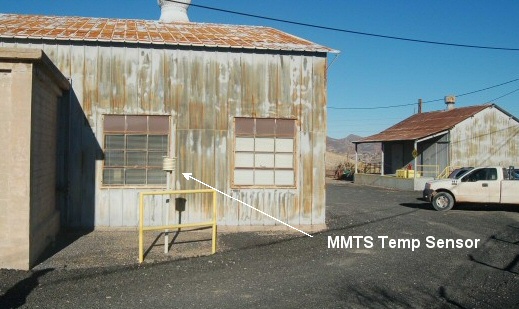A Junior High Science Project That Actually Contributes A Small Bit to Science
Cross-posted from Climate Skeptic
Tired of build-a-volcano junior high science fair projects, my son and I tried to identify something he could easily do himself (well, mostly, you know how kids science projects are) but that would actually contribute a small bit to science. This year, he is doing a project on urban heat islands and urban biases on temperature measurement. The project has two parts: 1) drive across Phoenix taking temperature measurements at night, to see if there is a variation and 2) participate in the surfacestations.org survey of US Historical Climate Network temperature measurement sites, analyzing a couple of sites for urban heat biases.
The results of #1 are really cool (warm?) but I will save posting them until my son has his data in order. Here is a teaser: While the IPCC claims that urban heat islands have a negligible effect on surface temperature measurement, we found a nearly linear 5 degree F temperature gradient in the early evening between downtown Phoenix and the countryside 25 miles away. I can't wait to try this for myself near a USHCN site, say from the Tucson site out to the countryside.
For #2, he has posted two USHCN temperature measurement site surveys here and here. The fun part for him is that his survey of the Miami, AZ site has already led to a post in response at Climate Audit. It turns out his survey adds data to an ongoing discussion there about GISS temperature "corrections."
Out-of-the-mouth-of-babes moment: My son says, "gee, dad, doesn't that metal building reflect a lot of heat on the thermometer-thing." You can bet it does. This is so obvious even a 14-year-old can see it, but don't tell the RealClimate folks who continue to argue that they can adjust the data for station quality without ever seeing the station.
This has been a very good science project, and I would encourage others to try it. There are lots of US temperature stations left to survey, particularly in the middle of the country. In a later post I will show you how we did the driving temperature transects of Phoenix.

Please pass along my congratulations to your son. I read the posts over at climateaudit yesterday and was impressed. Real science in the climate field is always interesting.
Are you trying to guarantee a failing grade? If you want him to pass, you need to have him figure out ways to correct for these errors to show that APG is really happening.
In the post-post-modern world science has been re-oriented. Talented scientists know that massaging the data to produce the required result is rewarded. The better lesson -- being right is not as much fun as being popular.
It is really nice to know that, your son has engaged himself with the scientific projects at 14. Nowadays most of the children's in his age group are wasting their time to play computer games and other unwanted things. My heartiest congrats to him...
Volvo Used Car Parts
Another interesting aspect would be to introduce him to "natural" regional biases. For example, Boulder, Colorado's UHSCN station is at 5,484 feet, right up against the foothills to the Rockies. It is therefore susceptible to warming downslope winds, most prominent in winter. Move that station six miles east, though, where both winds and UHI dissipate, and your averages come down. (I've been making comparisons for a few years now.)
This was the same cunundrum as when the weather service started reporting Denver's temperature from the new airport out east rather from downtown. TV stations now report temps that are consistently warmer than the airport's, reflecting both UHI and downslope warming.
Good reading here! Congrats to your son!
Cool experiment / fair project. Makes me think of a cool website my son and I use to do neat weekend science projects for fun and bonding. I will post the link for nayone interested in checking it out.
http://weirdsciencekids.com/FunExperiments.html
this site rocks my socks.. lol. byes byes..
this site rocks my socks.. lol. byes byes..